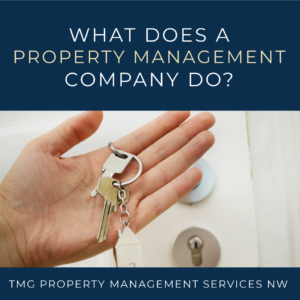As a real estate investor, you have 2 options for managing your properties. One option is to be a DIY landlord, and the other option is to hire a professional property manager. If you’re asking yourself “should I hire a property management company, or should I self-manage?”, there is no right or wrong answer. However, there may be a “right answer for you”- depending on your desired level of involvement, time availability, size of your portfolio, skill sets, and financial goals. This post aims to help you make the best choice for you, by answering some important questions about property management.
WHAT ARE THE RESPONSIBILITIES OF A PROPERTY MANAGEMENT COMPANY? Simply put, what can a professional property management company do for you? Residential property management companies offer different combinations of services. These depend on factors like the size of your property, the number of tenants, and how much oversight you’re willing to grant the property management company. Here is list of essential services to give you an idea:
- Evaluate the property and determine an accurate rental rate. This involves gathering data on recent rental rates in the area and working with the property owner to determine the optimal rental rate. Here are a couple of sample rental reports, for single family and multifamily The property management company may also include a detailed analysis of interior and exterior photos and make recommendations on repairs and improvements that can help maximize monthly rent while providing optimal ROI. Different policies (e.g. policy regarding pets and smoking) may also need to be discussed.
- Market the property for rent. This includes preparing the home for rent, taking professional photos, creating ads tailored to the advertising mediums, and promoting the listing through paid and free rental websites, MLS, signs, and fliers.
- Showings and communication. The property management company becomes the exclusive point of contact for your rental, answering inquiries about the property, showing it to prospective tenants- whether in-person or virtually, putting together rental applications that are legally compliant with fair housing laws, and collecting all the needed application fees.
- Tenant Screening and Selection. This involves performing thorough background checks to verify applicant’s identity, income, credit history, rental history, and more. The applicants would then be graded based on pre-defined tenant criteria. The goal is to find the most qualified tenant who will follow lease terms, pay rent on time, and take good care of the property, all the while maintaining strict compliance with Fair Housing Laws.
- Tenant Move-in. This includes drawing up leasing agreements, coordinating move-in schedules, reviewing lease guidelines such as rent payment terms and required property maintenance and insurance, ensuring all agreements have been properly executed, performing detailed move-in inspection with tenant, having tenants sign a report verifying the condition of the property prior to move-in, and collecting the first month’s rent and security deposit.
- Rent Collection. The property management company will handle all rent collection, receive rent via multiple options (such as online portals, in-person drop-off, or by mail), send out notices, and enforcing late payment fees while complying with landlord/tenant laws.
- Evictions. This involves filing all relevant paperwork to initiate and complete an unlawful detainer action, representing owner in court, and coordinating with law enforcement to remove tenant and tenant’s possessions from the unit.
- Legal. Staying on top of all legal matters related to Fair Housing and Tenancy can be overwhelming, whether you own one property or a large portfolio. The property management company eases the weight on the property owner’s shoulders regarding legal compliance and assumes this responsibility. This essential function includes understanding and abiding by the latest local, state, and federal legislation that applies to renting and maintaining rental properties. It also includes providing competent advice in the event of a dispute and referring owner to a qualified attorney if necessary.
- Inspections. This includes performing periodic inspections (inside and outside) on a predefined schedule, looking for safety hazards, code violations, lease violations, needed repairs, etc. Detailed property condition reports will then be sent to the owner.
- Financial. This involves handling all financial transactions, keeping detailed documentation of expenses, maintaining all records of paid invoices, leases, inspection reports, warranties, providing annual structured cash flow reports and required tax documents- including 1099, and sending out easy to read monthly owner’s statements which offer a detailed breakdown of income and itemized expenses.
- Maintenance, Repairs, and Remodeling. The property management company will provide and oversee a maintenance crew, hire professionals from a network of licensed, bonded and fully insured contractors who have been vetted for fair pricing and good quality work that is up to code; maintain outdoor areas (e.g. landscaping, removing trash and debris), maintain and monitor a 24-hour emergency repair hotline, provide recommendations on needed renovations to maximize rental income, prepare preliminary cost estimates for such rehab, and oversee the renovation project.
- Tenant Move-out. This involves inspecting the units and filling out a report on the property’s condition upon move-out, providing tenant with a copy of the report and the estimated damages, using the deposit to clean unit and perform needed repairs or upgrade, returning the balance of the security deposit to the tenant, re-keying the locks, and relisting the property back on the market for rent.
The scope of the responsibilities may vary, and is not limited to this list, but it is good to be informed of these services when you start a conversation with a prospective property management company.
Next question you may be asking is “HOW MUCH DOES A PROPERTY MANAGEMENT COMPANY CHARGE?” For Single Family properties, most companies will charge a management fee between 8% and 12% of the gross monthly income based on rent collected. For Multifamily properties, the management fees range from 3% to 5%. Make sure that the fee is based on rent collected rather than rent due, or you will be paying the fee even in the event of a vacancy. Additional fees may also apply. For example, there may be a leasing fee each time the property is leased to a new tenant, and another fee when current tenants renew or extend their lease. These fees are designed to cover the property manager’s expenses for marketing the property and preparing required documentation. As a leasing fee, a management company can charge anywhere between 50% and 100% of the first month’s rent.
DO I NEED TO HIRE A PROPERTY MANAGEMENT COMPANY? There is no rule that you need a property management company, but here are multiple situations to consider that may warrant hiring one.
- You plan on acquiring multiple rental properties. The more rental properties you have in your portfolio, the more it becomes a necessity to hire a professional to manage them efficiently.
- You are not within a close proximity of your asset. If your rental is far from where you live, it’s a good idea to hire a manager who can keep better tabs on it.
- You don’t want to actively manage the property. If you view your property as a source of passive income, you will need a property manager to take care of routine maintenance and daily operations.
- You don’t want to be an employer. Hiring employees, like a resident manager, comes with several responsibilities such as payroll and legal requirements. Your property management company is not your employee; they are an independent contractor. Using one can relieve you from the burden of becoming an employer.
- You can afford the added cost. Property managers charge a percentage of the rental fee, which is well worth it. The same fee can rid landlords of a lot of headaches and free up a lot of their time to research and invest in other places.
- You have limited time. Even if you don’t mind managing your own rental property, you may not be able to actively work on the property every day. If you plan on focusing more on running your own business, hiring a property management company may be your best course of action.
- You can afford it. The cost is at least equal or above the value you place on your time and trouble.
- You have a property in the affordable housing program. Usually, in programs like these, owners may receive grants, tax credits, or loans with low-interest rates in return for renting to those with low-income levels. With these benefits also come more complicated rules you must adhere to. Having a property management company that knows the ins and outs of these rules can help exponentially in the long run.
The decision to hire a property management company, ultimately depends on your unique situation as a property owner. When you do make that decision to hire a firm, make sure you do your research carefully. Choosing a good one can make a big difference whether you meet your financial goals for you and your family or not.
To help you determine whether a prospective property management company is the right fit, here is a list of questions to ask during an interview:
- How long have you been in business?
Make sure to hire a company that has been in business for many years. This allows a long enough track record to call references prior to hiring - How has your business model changed during that time?
This will tell you how responsive the company is to industry changes and the evolution of technology. - Which property management services do you currently offer?
Not all property management companies offer the same services. Be sure that this company offers a full suite of services that meets your needs. - How many rentals do you currently manage?
This will help you to gauge the company’s size and expertise. Be sure that the company isn’t stretched too thin given the size of their staff. - Do you manage any other rental properties in my area?
You want to be sure that your property management company understands the nuances of your local rental market. - Which areas does your company service?
If you own or are considering investing in properties in multiple cities or towns, having a large coverage area could be beneficial. - Which types of properties do you manage?
A property manager who manages single family rentals will have a different approach than someone who manages commercial or retail properties. Be sure to find someone within your market niche. - How do you set your rental rates?
Any credible company should be able to run a market analysis that informs rental rates based on a number of variables, including your local market, the unit size, the amenities you offer, etc. - Which strategies do you use to fill vacant units quickly, without sacrificing tenant quality?
This provides insight into their leasing strategies when pressed with a deadline. - Can you explain Fair Housing laws?
A good property manager should be fluent in all local, state, and fair housing laws. - Do your team members have specialized roles, or are they generalists?
You’ll want to know whether one person is responsible for managing your rental, or whether the company takes an all-hands-on-deck approach to service delivery (one person who markets the units, another who’s responsible for repairs and maintenance, another who’s an accounting expert, etc.). - Which types of insurance do you carry?
Look for companies that carry at least a $1 million general liability policy, as well as an errors and omissions policy. - What are your monthly management fees?
Management fees generally run anywhere between 8-12% of total monthly revenues but can vary depending on the services offered. - Do you collect management fees when a unit is vacant?
If so, run away. Property managers should be incentivized to lease units quickly–and forfeiting a portion of their fee in the meantime is generally the industry standard. - Are there miscellaneous fees that I should expect to incur?
Some companies charge extra for marketing units, evicting tenants, turning over units, etc. - What’s your procedure for qualifying tenants?
Learn whether the company uses background, employment, credit, and landlord reference checks as part of their screening procedures. - What is the average vacancy rate among the properties you manage?
Consider whether this vacancy rate is above or below the area average. - How long do units typically stay vacant after turnover?
Look for companies that will have units rent-ready and leased up again within 30 days, which should give them plenty of time to refresh the unit and perform any repairs. - What’s your process for handling service requests?
You’ll want to know what the process is for tenants to communicate service requests to the PM, as well as your role in the process. Will you be making final decisions about repairs and maintenance? Can you require authorization for any expenses above a certain amount? Look for a company with a well-thought-out process. - How often will you provide me with updates about my property?
You should be able to obtain information about your property as often as you’d like. More sophisticated PM companies will leverage technology (e.g. online dashboards) to provide you with real-time information about your portfolio. - What is your preferred method of communication?
If you are someone who insists on speaking over the phone, but this property manager insists on communicating by text or email, this could be a mismatch. Look for companies that are willing to communicate through various media—not just with you, but with residents and vendors, too. - Do you have pre-existing relationships with local vendors?
Find out who the property manager subcontracts with, and whether any discounts are available through those relationships. - Will you be able to provide me with investment advice or help me to grow my portfolio?
More advanced property management companies will be able to help you to identify market opportunities—whether through the purchase or sale of assets—and help you to position your assets in a way that maximizes your return on investment.
About TMG Property Management Services:
As a property management firm, TMG has been in business since 1985 and manages many kinds of properties, including single-family residences, townhomes, plexes, apartments, and condominiums. We can perform as few or as many property management functions as you see fit, including tenant placement services. TMG offers a comprehensive and customizable suite of property management services and management fees that are among the most reasonable in the industry. Below is a description of our range of services.
Tenant Placement Services
This program is for owners who are comfortable collecting rent, doing maintenance, and handling tenant communication, but need some extra help finding qualified tenants. We prepare your photo’s listing, post it on 30+ different websites, coordinate showings to potential tenants, screen tenants, perform a move-in inspection, prepare and sign lease documents, recommend maintenance, and more. Get more information about Tenant Placement Services.
Multifamily Property Management – Typically More Than 35 Units
TMG provides world-class, standard-setting, multifamily property management. Our staff is laser-focused on keeping your tenants happy while securing the biggest return on your investment properties. Read more about our Multifamily Property Management
Single Family Property Management
We offer a broad range of services for single family property management, all aimed at getting the highest return from your investment and freeing up your time and energy. Read all about our Single Family Property Management services.
Small Community Rental Program (SCRP) – Typically Under 35 Units
We have designed our own, exclusive program for multiple houses, apartments, condominiums, townhomes, and plexes that are in close proximity and do not require onsite management. This is a hybrid management plan, incorporating aspects of both single family and multifamily management. Read more about SCRP.
If you already work with a property management company but are hoping to find a manager who better serves your needs, consider a new partnership with TMG. We promise to make the transition seamless. We will work directly with your previous management company to gather information, transfer records, notify tenants, and transfer utilities.
Contact our New Business Team or get a free rental analysis. TMG is ready to help you maximize your rental income and answer all your questions about our services. We look forward to speaking with you.





